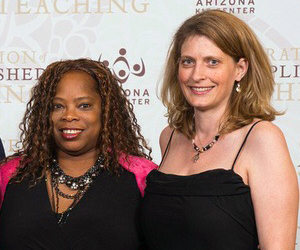Maricopa Unified School District’s implementation of the College and Career Readiness Standards, commonly known as Common Core, is going well, educators say.
The Arizona State Board of Education adopted Common Core in June 2010, according to the Arizona Department of Education. According to ADE, the standards are designed to “ensure that all students have the academic knowledge and skills necessary to succeed in college, career and life … and focus on critical-thinking, problem solving and effective communication skills.”
Common Core is “an increased level of depth and rigor to the pre-existing standards” and prepares students more for college and career readiness, said Wade Watson, director of curriculum and instruction at MUSD.
At the secondary school level, these standards are very similar to what teachers taught in advanced placement courses and are “reminiscent” of college preparatory courses, Watson said.
For example, the standards in the English Language Arts curriculum focus more on “close reading,” he said.
Close reading is reading a text more than once with an emphasis on understanding the concepts and analyzing what is read, he said.
MUSD’s professional development coordinator Heidi Vratil said, “implementation of Common Core changes a lot of how we teach – (we teach) more at the conceptual level.”
“It is no longer just memorization of multiplication facts,” Vratil said. “It is understanding how we multiply, why we multiply and its purpose in the real world.”
“Maricopa is doing very well (implementing Common Core),” Watson said, noting the district was among the early adopters.
Vratil agreed: “I believe we’ve been ahead of the game; we started implementing the standards a few years ago.”
“(Common Core) is a challenge in that it changes how we are teaching,” she said. “It’s not easy, but our teachers have lived up to the challenge and have done great work.”
Watson said the district’s teachers are “doing beautifully. It’s exciting to see where we’re going.”
Treva Jenkins is a seventh grade language arts teacher and the department chair at Maricopa Wells Middle School. She teaches reading and writing.
“I love Common Core … It increases the rigor in the classroom and prepares students for life after high school,” Jenkins said.
Her class just finished reading “Animal Farm” by George Orwell.
Before the students started reading the book, they researched communism, capitalism and socialism. She asked her students, “What is happening in the world around you today? How is this book applicable today?”
She said her students are talking about Russian President Vladimir Putin and what is going on in Ukraine in their discussion about the book.
Jenkins said Common Core is a “difficult transition” for students and teachers alike. “It is not the way many teachers are used to teaching and not the way that many students are used to learning. There will not be instant results, but instead will be a slow process.”
***ADVERTISEMENT***She cited the lack of an equivalency test for students with special needs and the cost of updating technology to accommodate the assessments, most of which will be online, as additional challenges.
Watson said the Partnership for Assessment of Readiness for College and Careers (PARCC) is the organization the state of Arizona is expected to use to test student achievement under the Common Core standards.
In 2014-15, the PARCC test will replace Arizona's Instrument to Measure Standards (AIMS) student testing.
He said the state has yet to formally contract with PARCC, and schools still don’t know how much testing the state will fund. “We won’t really know until Arizona says this is what we will contract for.”
Wade said the federal government is not forcing Common Core on states as a prerequisite to receiving funding. Some states have chosen not to adopt Common Core, which, according to corestandards.org, was developed by the nation's governors and education commissioners with input from teachers, parents, school administrators and other education experts.
The federal government is requiring schools to assess students regularly and report the data, he said.
“The federal government is asking for more accountability in education,” Vratil said. “Common Core is one way to meet that accountability.”




![Maricopa sheds tears amid Maui wildfires that killed dozens For Maricopa resident Janelle Gomez, the sorrow mirrors the loss of a family member. [Brian Petersheim]](https://www.inmaricopa.com/wp-content/uploads/2023/08/Gomez-218x150.jpg)
![Embracing Freedom: Celebrating the Fourth of July Councilmember Vincent Manfredi at Great American 4th 2021 [Victor Moreno]](https://www.inmaricopa.com/wp-content/uploads/2023/07/2021-Great-American-4th-e1688414543522-218x150.jpg)












